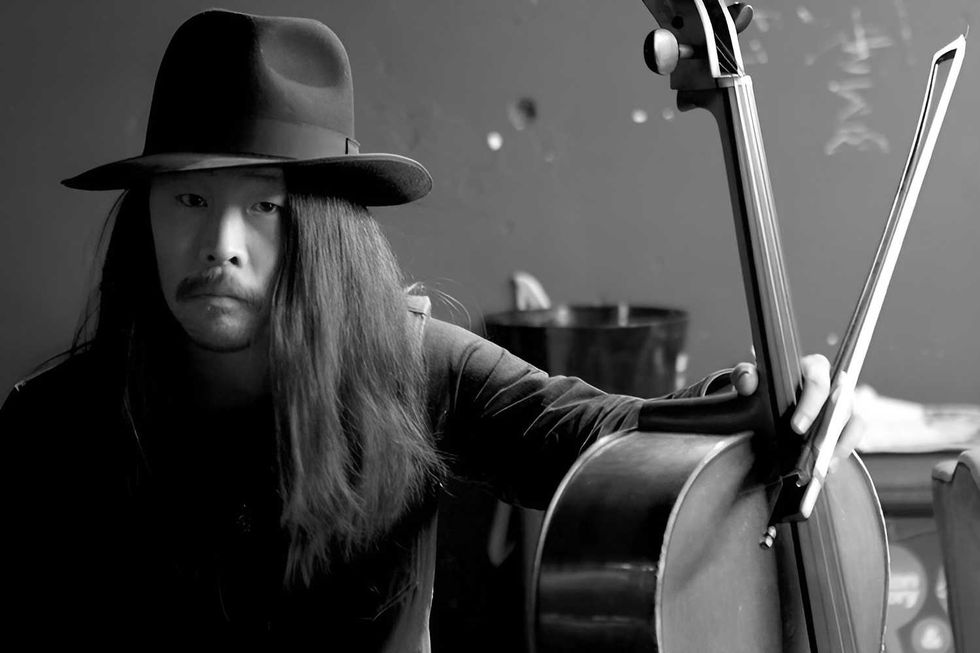The Review Is in
Gilbert and Sullivan Society brings a charming Princess Ida to life in skillful production

The year is 1884 and in Italy, Puccini is having his first success with a one-act opera and ballet he calls Le villi. Verdi premieres a second version of his stormy Don Carlo, and in Paris, Massenet offers his considerable masterpiece, Manon. Across the Atlantic, the Metropolitan premieres the Dresden version of Wagner's epic Tannhäuser. With all that portentous work, it's no wonder that Londoners, not to mention folks in other big cities, crave a bit of light opera. The latest thing from W.S. Gilbert and Arthur Sullivan? A striking satire called Princess Ida, after the popular poem by Lord Alfred Tennyson.
Right now the Gilbert and Sullivan Society of Houston is offering a modest yet elegant staging of this unusual work, which has always seemed to me to be in the shadows of The Mikado, The Pirates of Penzance, or H.M.S. Pinafore. It's not really the first opera you think of when the beloved Victorian duo comes to mind.
Yet you would be missing out terribly not to attend one of these performances before the run finishes at the end of July. The production has a feeling of great authenticity, not to mention a heartfelt poignancy. It's a funny work, yes, but underneath the laughs one finds a bittersweet sensibility.
Much of that authenticity comes certainly from stage director Alistair Donkin, who sings the role of King Gama here and who has, as well, a singular connection to London's D'Oyly Carte Opera Company. He was a member of that legendary group. Donkin has been with The Gilbert and Sullivan Society of Houston for 35 years, which is something to celebrate.
This is the society's 64th anniversary performance, and Donkin is clearly at the heart of this ensemble. He is a kind of treasure, singing with great power and acting as if it were only second nature for him. I found him fascinating as the absent-minded King, never a ham, except when he was supposed to be, and always exceedingly funny. He is a unifying factor for the company and an important link to tradition.
This light opera (I call it that only because it has long sections of spoken dialogue) takes a poke at feminism, Darwin, and other topics that must have raised eyebrows in the Victorian age. Oh, wait, Darwin still raises eyebrows. And feminism is hardly an old-fashioned topic. What I am trying to say is that Princess Ida, despite its comic approach and demeanor, has great cultural relevance for contemporary audiences."The world is a but a broken toy, its pains alone are true," begins one song. Perfect poetry for our dark times.
What has changed, it seems, are the cultural references that Gilbert and Sullivan dropped with such skill into the finished score. Ovid, Aristophanes, Hipparchus, Juvenal. The back page of the program includes a glossary for contemporary audiences, and it's fascinating to peruse. I knew what Helicon was, but I'd never heard the phrase "set the Thames on fire," the London version of today's "when pigs fly." Most libretti today do not have this sophistication. Story-wise, Princess Ida wraps up a bit too fast, even for its length, but this can be forgiven in view of the many wonderfully lilting melodies.
Dr. Brian Runnels is a classy conductor, and the small group of orchestra musicians brings a big, yet refined sound to the Cullen Theater. This was evident from the first notes of the overture, and the playing didn't get lazy as the performance finished exactly three hours later. The chorus is well-trained, articulate, and never too loud. It seems that they have practiced singing without always sounding like they have to conquer something. I admire that very much. It's discreet, perfect singing with dynamic sophistication.
In the title role is soprano Megan Stapleton, an artist of clarity, power, and much expressivity. She is also a gifted actor, playing the role with a studied intensity. She is, after all, playing the head of a women's university where no men are permitted. She has to be imposing for the 100 young women who follow her lead. I found her glamorous presence on stage mesmerizing, her voice melodious when it had to blend with others in an ensemble, but always extraordinary in solo passages. She has star quality, and I look forward to hearing her again in Houston or elsewhere.
Joshua LaForce is a wildly charismatic Hilarion, even in the strange blond wig he sports throughout the evening. Probably he was the most emphatic singer of the evening, stealing just a few moments to really belt it out. He's got the high notes, so why not let us hear them at full volume? This is where "light opera" borders on entertainment, but he kept it from descending into kitsch.
Dennis Arrowsmith is a slightly muffled Florian, as if he might have had a cold on Saturday. Still, the technique is there and he is a charming actor. In the somewhat smaller role of King Hildebrand is Joe Carl White, who sounds a bit too Broadway to my ears, especially in sections where the syllables come fast and furious. Every Gilbert and Sullivan opera has a notable patter song. White's needed a bit more work.
The production is traditional and the costumes are sumptuous. If anything could be corrected, it would be to open up the space a bit more. The silhouettes of a unicorn and peacock were not worth keeping and crowding everyone downstage. The stage, already smallish, seemed even tinier, and the stage design wants some editing. The blocking is a bit hokey, and the eye of a true choreographer could help refine this aspect. Again, it looks a little crowded overall.
These are small things, however. If you really want to see a skillful production of a lesser-known Gilbert and Sullivan opera, this is for you.
Princess Ida will be performed on July 29-31. For more information, visit The Gilbert and Sullivan Society of Houston website.






